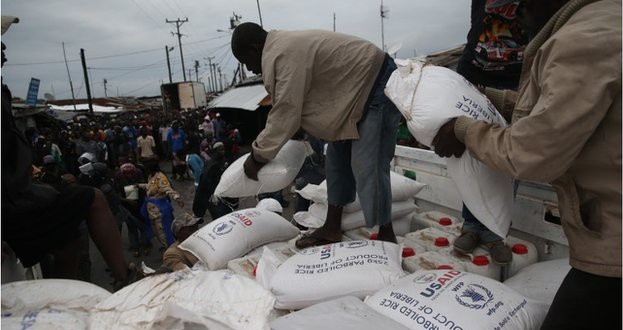
Wild price swings caused by the Ebola crisis are making it difficult for households to feed themselves and earn a stable living, and action is required to keep food on the market, protect the poor and support farmers, according to a new UN report released on Monday.
“Border closures, movement restrictions and a slowdown in farming activity are shaking food markets badly,” said Ayodele Odusola, chief economist at the Regional Bureau for Africa of the United Nations Development Program (UNDP).
“This could have a disastrous impact on households, both because farmers are unable to make a living and because families are finding very different prices on the local market from one day to the next. People living in rural and remote areas are feeling the impact of reduced purchasing power more than their urban counterparts,” he said.
Since the onset of the Ebola epidemic early this year in West Africa, buying power has dropped by 20 percent in Sierra Leone and by more than 25 percent in Liberia, said the study. Liberia, with one of the fastest-growing economies in the world last year, could experience negative GDP growth for the first time since the war ended 11 years ago, the report warned.
The study also found rural communities were worst affected, due to soaring transport costs and declining farming incomes. Reduced traffic has been observed in more than two-thirds of Liberia’s counties and up to 40 percent of farms have been abandoned in the worst-affected areas of Sierra Leone.
Rice and maize production has been scaled back for the main harvest season as migration and movement restrictions cause labor shortages on farms. Cash crops like palm oil, cocoa and rubber have also been seriously affected, squeezing the purchasing power of many families, who will also lose income and nutrition due to the ban on bush meat.
Food prices have increased by 50-100 percent in much of the affected region, and the NGO Action Against Hunger reported that the price of cassava – a key dietary staple – increased by almost 150 percent in the Liberian capital, Monrovia, during the first week of August alone. Additionally, there are already food shortages in Senegal and other countries in West Africa, because regional trade has been disrupted.
Concerted action is required to stabilize prices and ensure people are able to buy and sell enough food to meet their needs, says the report. For instance, Guinea was able to limit surging rice prices associated with reduced stocks by importing more of that grain.
The study proposes a four-fold solution: governments in Ebola- hit countries should keep their borders open to ensure food reaches markets and people; social safety nets such as farming subsidies and cash payments could help to improve the situation for the poorest and most vulnerable.
These safety nets should be accompanied with nutrition and health interventions, the report said. For example, a conditional cash transfer program linked to health can help improve access to nutritious foods, particularly when prices are high, while promoting health service use. Importantly, investing in the nutrition and health of vulnerable populations could lower the mortality rate of diseases like Ebola, as nutritional status and infection are intricately linked.
At the same time, governments and the international community should step up their support for local farmers so as to prepare them for the next planting season, which takes place in February and March, the report said. Doing so would help to avoid food shortages in 2015 and beyond.
Fourth, the document calls for a combination of fiscal and monetary policies designed to keep currencies afloat and prices down.
To date, WHO has reported 15,351 Ebola cases in eight countries since the outbreak began, with 5,459 reported deaths, mostly in Sierra Leone, Liberia and Guinea, the three hardest-hit West African countries. Mali, previously free from the virus, is the latest country to register Ebola cases.
